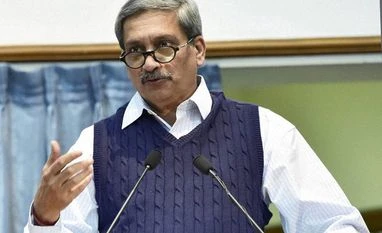Defence Minister Manohar Parrikar and Army chief General Bipin Rawat on Thursday expressed concern over possible use of biological and chemical weapons in warfare.
They were speaking at an event where the Defence Research and Development Organisation (DRDO) handed over Nuclear, Biological, Chemical Reconnaissance Vehicle (NBCRV) and NBC treatment drugs to the Indian Army.
The DRDO also handed over indigenous Weapon Locating Radar (WLR) named Swati to the Army, with Parrikar saying that it will bring down artillery fire along the Line of Control (LoC).
The Defence Minister said he had seen pictures in the media of locals suffering from blisters in Afghanistan, which suggested that chemical weapons were possibly used there.
"In southern and northern parts of Afghanistan, I have seen photographs of local population suffering from blisters... At this moment, I don't have confirmation on this, but the photos were quite disturbing," Parrikar said.
"We should be prepared for any kind of warfare," he added.
Also Read
On similar lines, General Rawat said: "Although chemical weapons have been banned by the United Nations, it could be used by an adversary."
According to some reports, some locals in Waziristan region had blisters and wounds which appeared to be induced by use of chemical weapons.
Asked if he felt that India was under threat of a chemical or biological weapon attack, the Minister said it was just about being prepared for any eventuality.
"We must be prepared for any eventuality," he said.
NBCRV Mark 1 has been developed by the Vehicle Research and Development Establishment (VRDE) and is capable of collecting solid and liquid samples of a biological contaminated area, mark the nuclear and chemical contaminated zone and transfer the recce data.
The medicines are antidotes and de-corporating agents for chemical, biological, radiological, nuclear (CBRN) emergencies.
WLR Swati, developed by the DRDO's Electronic and Radar Development Establishment, provides fast and accurate location of enemy artillery including shells, mortars and rockets.
The radar is also capable of guiding fire from an artillery gun attached to it, meaning thereby that the radar can not only locate artillery guns on the enemy side but also ensure their destruction.
"Swati could be a great equipment to ensure adversaries do not use artillery fire. If the LoC is devoid of any artillery fire in the near future, you can be sure Swati radar has gone there," the Minister said.
Sources said four radars deployed along the LoC for trial have already proved their efficacy since artillery fire from Pakistan's side had reduced after their deployment.
"The radars have been on the LoC for two months now for trials. Artillery fire has gone down," a defence source said.
)